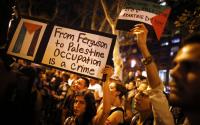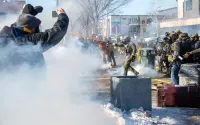30 April 2004By Rupert Cornwell in Washington and Patrick Cockburn in Baghdad
In a particularly ominous turn for President George Bush, opinion is hardening in both the US and Iraq against his handling of the Iraq conflict, amid rumblings of unease in the military and among diplomats at the course of events there and the Middle East as a whole.
According to a New York Times/CBS News poll, for the first time less than half of Americans - 47 per cent - now believe it was the right decision to invade Iraq. Support has slumped from 58 per cent just last month, 63 per cent in December, and over 70 per cent when the war began.
That finding coincides with a no less alarming survey of the mood within Iraq itself. The basic message of a new CNN-USA Today poll is that ordinary Iraqis are glad that Saddam Hussein has gone but feel less secure than when he was in power. They no longer regard US forces as liberators, but as heavy-handed occupiers.
By a 56-37 majority, Iraqis would prefer US and British troops to leave their country at once. Over two-thirds believe that, during military operations, US forces are "not trying at all" to protect ordinary civilians from being killed or wounded.
Almost 3,500 Iraqis, from all sections of the population, were interviewed, in the biggest exercise of its kind yet. Opinion is split on whether Iraq as a whole is better off as a result of the invasion, although a clear majority say they personally and their families are financially better off.
However, the poll includes the semi-autonomous Kurdish areas of Iraq, where support for the invasion was almost 100 per cent. In Baghdad itself, by a three to one majority, people now believe the war has done more harm than good.
Two-thirds of Baghdadis say the current attacks against US forces are sometimes or always justifiable. Much of the polling, moreover, was carried out before the latest upsurge in violence, and the flare-ups in the cities of Najaf and Fallujah.
It is very difficult in Baghdad to find anybody willing to say a good word for the US. "The Americans really have made a terrible mess of it,'' complained Dr Mahmoud Othman, veteran opponent of Saddam Hussein and a member of the US appointed Iraqi Governing Council in Baghdad. "People in Baghdad, a year after the US took over, are afraid to leave their homes even in the daytime. That is real failure.''
Abu Amir, a shopkeeper in the middle-class Jadriyah district of the capital, said: "Under Saddam, I sometimes did not make money in my store but I could go home in the evening without worrying if my son had got back safely. Now there is looting everywhere.''
The mood is no better on the home front, on the eve of the first anniversary of Mr Bush's "Mission Accomplished" appearance on the aircraft carrier Abraham Lincoln, in which he announced an end to "major combat operations" in Iraq.
Speaking in Denmark yesterday, Colin Powell, the Secretary of State, conceded the US military had faced "tough" weeks in Iraq. When casualties were rising, he said, "this causes people to stop and think and reflect, 'What are we doing?"
General Powell was speaking hours after 10 more US soldiers were killed in Iraq, eight of them in a car bombing near Baghdad. At least 126 US servicemen died in Iraq in April 2004, making it the bloodiest month of the conflict by far.
During the seven-week war proper, only 109 US troops were lost to hostile action. During a teleconference with Mr Bush this week, General John Abizaid, head of US Central command and in overall charge of the Iraq campaign, is said to have expressed his fear that if the Fallujah and Najaf rebellions were quashed, the fighting might nonetheless spread.
Gen Abizaid is also worried that more Iraqis were not opposing the insurgents.
The Pentagon, meanwhile, is urgently shipping more heavy armour to Iraq, after complaints by commanders on the ground that existing equipment offers insufficient protection.
The growing criticism of the administration's Iraq policies is not translating into increased support for Senator John Kerry, Mr Bush's probable Presidential election opponent in November. According to the New York Times/CBS poll, the two are still virtually tied.
Also in Americas
Polls reveal Iraqi opposition and fall in US support for warBush and Cheney testify in secretWater crisis as Mexico City sinks faster than VeniceUS investigating abuse of Iraqi prisonersUtah judge sentences woman for refusing Caesarian
http://news.independent.co.uk/low_res/story.jsp?story=516690&host=3&dir=70






